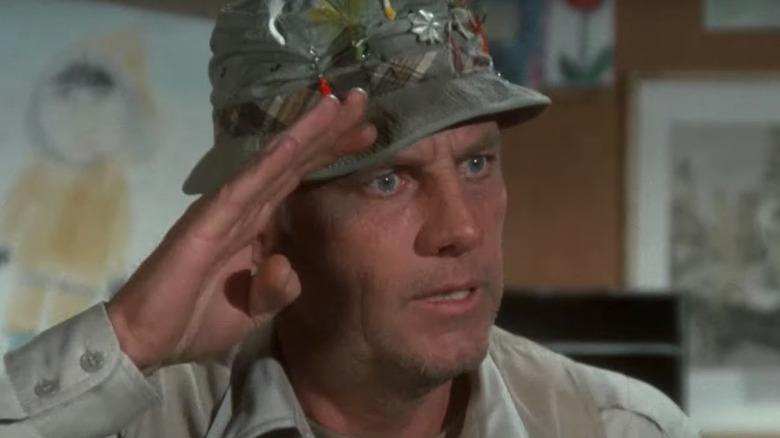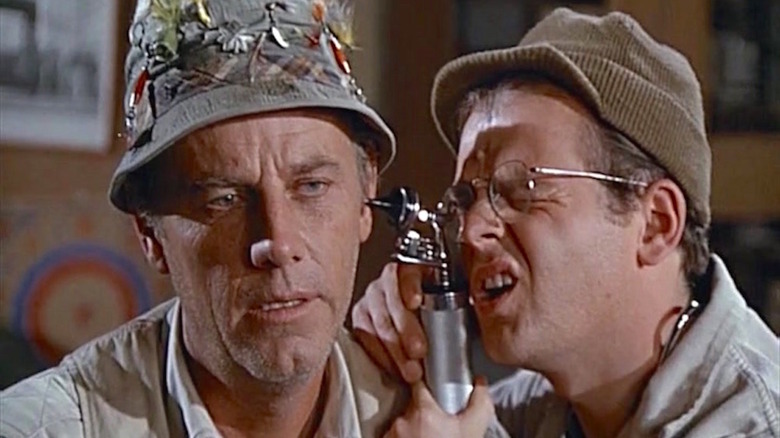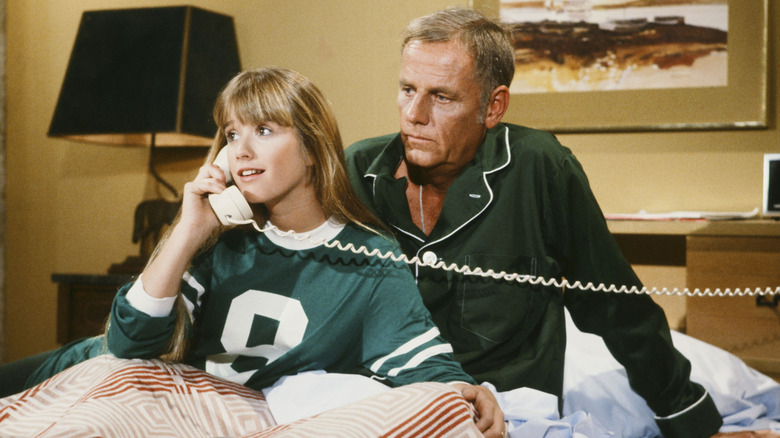McLean Stevenson Learned His M*A*S*H Character Was Beloved The Hard Way
Sudden success is a hell of a drug. Be it entertainment, sports, or certain, shockingly competitive sectors of the healthcare industry, you can count on numerous fast risers to get high on their own supply and take an ego-fueled torch to their career.
Television actors are especially susceptible to these vain slip-ups, and it's easy to understand why. Before the advent of prestige TV, the small-screen medium was, particularly for young-ish performers, viewed as a potential springboard to big-screen stardom. Sometimes it works out. Chevy Chase bolted from "Saturday Night Live" midway through its second season and instantly became a movie star on the strength of his work in Colin Higgins' sporadically hilarious "Foul Play" (even though he's far from the funniest element of the film). And sometimes you're David Caruso, who quit "NYPD Blue" to topline a pair of 1995 flops in Barbet Schroder's "Kiss of Death" (underrated) and William Friedkin's "Jade" (overripe, yes, but way overhated).
Generally, if you cut out early on a hit show, you're doomed. Just ask Shelley Long, Mischa Barton, or Sherry Stringfield.
Or whip out your Ouija board and make a long-distance phone call to McLean Stevenson, the man who mistook his celebrated portrayal of Lieutenant Colonel Henry Blake on "M*A*S*H" as proof of imminent stardom. When he left the series after season three in 1975, he went straight to work on his own NBC sitcom. "The McLean Stevenson Show" was not, sadly, "M*A*S*H," and, in the wake of its failure, Stevenson went from burgeoning star to showbiz cautionary tale.
Overestimating the McLean Stevenson market
Stevenson passed away in 1996 (one day prior to the death of Roger Bowen, who played Henry Blake in Robert Altman's 1970 film), but via archival video footage spliced into Fox's special "M*A*S*H: The Comedy That Changed Television," we know that the actor rued his decision to leave the hit sitcom for the rest of his life.
He wasn't the only person who regretted his departure. Viewers and CBS network executives were none too pleased with his exit. According to the Fox special, however, his colleagues were more forgiving. Producer/showrunner Burt Metcalfe could tell the actor wanted out. "McLean Stevenson was wonderful as Colonel Blake," he said. "But he began getting restless and expressing the desire that maybe he wanted to move on."
Writer Gene Reynolds saw the writing on the wall as well. In an interview on the Fox documentary, Reynolds said:
"People were whispering in his ear, 'You can have your own show,' but they didn't say, 'You won't have Larry Gelbart. You won't have the cast, you won't have Radar, you won't have all these people around you. You won't have the same situation.'"
This turned out to be a deadly sin of omission.
A fine, comedically gifted actor who just couldn't catch a break
Created by the "Rhoda" writing duo of Norman Barasch and Carroll Moore, "The McLean Stevenson Show" only lasted 12 episodes (despite its banging Paul Williams theme song). His next sitcom, "In the Beginning," had the 1970s can't-miss pedigree of Norman Lear, but it ended after nine episodes. NBC gave Stevenson another shot in 1979 by trying to spin his Larry Alder character off the Nielsen ratings smash "Diff'rent Strokes;" at 38 total episodes, it was his biggest post-"M*A*S*H" success.
Though Stevenson was still a big enough name to guest host "The Tonight Show" on occasion in the 1980s while Johnny Carson was on vacation, he was well aware that leaving "M*A*S*H" was a mistake. As he was shown saying in the Fox special:
"There were a number of things that went into that. I had gotten too big for my britches, I think, and I've never admitted that. Here I am now talking to hopefully millions of people, so...The thing I didn't realize was that two people really didn't give two hoots in hell about McLean Stevenson. They loved Henry Blake."
He's right. We did love Henry Blake. But we loved McLean Stevenson's Henry Blake. And Stevenson was clearly talented and charismatic enough that we would've loved him in other roles had he found the right collaborators. Stevenson did nothing wrong. He put in three solid years on "M*A*S*H" and bet on himself. He just never found his "CSI: Miami." But I think we all can agree he would've crushed Caruso's part in "Jade."


